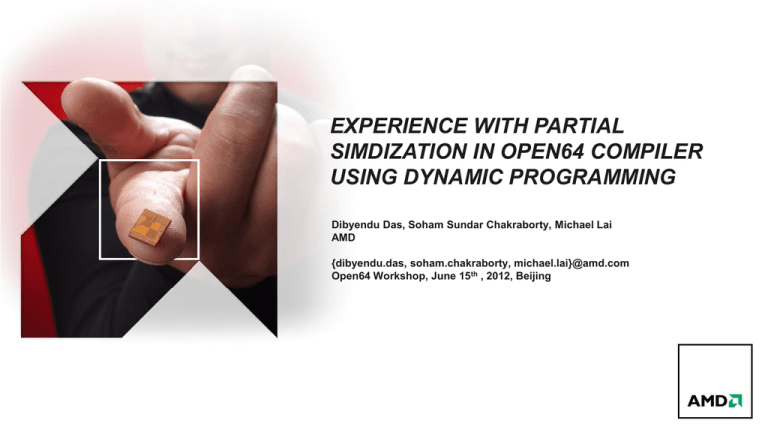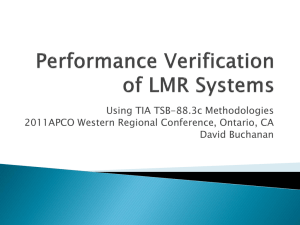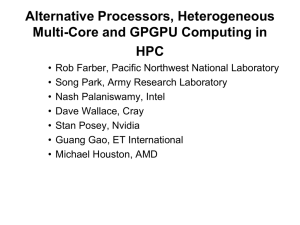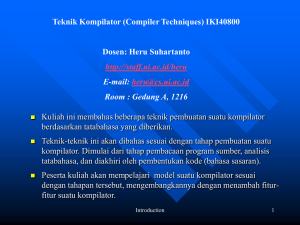
EXPERIENCE WITH PARTIAL
SIMDIZATION IN OPEN64 COMPILER
USING DYNAMIC PROGRAMMING
Dibyendu Das, Soham Sundar Chakraborty, Michael Lai
AMD
{dibyendu.das, soham.chakraborty, michael.lai}@amd.com
Open64 Workshop, June 15th , 2012, Beijing
AGENDA
Introduction to Partial Simdization
Overview of Barik-Zhao-Sarkar Dynamic Programming-based algorithm
Motivating Example – hot loop in gromacs
Our Approach
Initial Results
Conclusion and Future Work
2 | Experience with Partial Simdization in Open64 Compiler Using Dynamic Programming | June 15th, 2012 | Open64 Workshop 2012 | Public
PARTIAL SIMDIZATION
Effectively utilize and exploit the SIMD (vector) ISA of modern x86 microprocessors
Traditional loop-based vectorization adopt an all-or-nothing approach in SIMDizing loops - frequently
employing fission or other techniques to separate the non-vectorizable part from the vectorizable part
Partial simdization packs isomorphic instructions to SIMD instructions (if possible),
– Most of the opportunities still loop-based
– Need not have all instructions packed
SLP (Superworld-level-parallelism) [ Larsen et al.] one of the most well-known partial simidization
techniques
A simple example of partial simdization:
3 | Experience with Partial Simdization in Open64 Compiler Using Dynamic Programming | June 15th, 2012 | Open64 Workshop 2012 | Public
PARTIAL SIMDIZATION - EXAMPLE
1: for (it = 0; it < n; it++) {
2: i = a[it] + b[it];
3: j = c[it] + d[it];
4: k = e[it] + f[it];
5: l = g[it] + h[it];
6: m = i + j;
7: n = k + l;
8: res[it] = m + n;
}
simd
scalar
1: for (it = 0; it < n; it++) {
2: vt1 = pack< a[it], e[it] >
3: vt2 = pack< b[it], f[it] >
4: vt3 = pack< c[it], g[it] >
5: vt4 = pack< d[it], h[it] >
6: vt1 = vt1 + vt2; <i,k>
7: vt3 = vt3 + vt4; <j,l>
8: vt1 = vt1 + vt3; <m,n>
9: m,n = unpack vt1
10: res[it] = m+n;
}
1: for (it = 0; it < n; it=it+2) {
2: i1 = a[it] + b[it];
3: j1 = c[it] + d[it];
4: k1 = e[it] + f[it];
5: l1 = g[it] + h[it];
6: m1 = i1 + j1;
7: n1 = k1 + l1;
8: res[it] = m1 + n1;
9: i2 = a[it+1] + b[it+1];
10: j2 = c[it+1] + d[it+1];
11: k2 = e[it+1] + f[it+1];
12: l2 = g[it+1] + h[it+1];
13: m2 = i2 + j2;
14: n2 = k2 + l2;
15: res[it+1] = m2 + n2;
}
1: for (it = 0; it < n; it=it+2) {
2: va = <a[it], a[it+1]>
3: vb = <b[it], b[it+1]>
4: vc = <c[it], c[it+1]>
5: vd = <d[it], d[it+1>
6: ve = <e[it], e[it+1]>
7: vf = <f[it], f[it+1>
8: vg = <g[it], g[it+1]>
9: vh = <h[it],h[it+1]>
10: <i1,i2> = va+vb
11: <j1,j2> = vc+vd
12: <k1,k2> = ve+vf
13: <l1,l2> = vg+vh
14: <m1,m2> = <i1,i2>+<j1,j2>
15: <n1,n2> = <k1,k2>+<l1,l2>
16: <res[it], res[it+1]> = <m1,m2>
+ <n1,n2>
}
Example courtesy: “SIMD Defragmenter: Efficient ILP
Realization on Data-parallel Architectures”,
Y. Park et al., ASPLOS 2012
4 | Experience with Partial Simdization in Open64 Compiler Using Dynamic Programming | June 15th, 2012 | Open64 Workshop 2012 | Public
OVERVIEW OF BARIK-ZHAO-SARKAR (BZS) ALGORITHM
Dynamic Programming based approach
– Data Dependence Graph is built for each basic block
– k-tiles are built, each tile consists of k isomorphic independent operations
– Two sets of costs built
Scalar Cost of each node n
Vector/SIMD Cost of k-tiles
– [Pass 1] Dependence Graph traversed from source to sink, build scalar and vector costs, use dynamic
programming rules
– [Pass 2] Best costs are determined , decide between whether a k-tile should be SIMDized or not
Use scalar cost vs vector cost comparison for this purpose
– [Pass 3] Generate SIMD+scalar code
5 | Experience with Partial Simdization in Open64 Compiler Using Dynamic Programming | June 15th, 2012 | Open64 Workshop 2012 | Public
BARIK-ZHAO-SARKAR (BZS) ALGORITHM - ILLUSTRATED
Various combinations of packing ( assume 2-tiles) possible
– <ld a[it], ld b[it]> OR <ld a[it], ld c[it]> OR <ld a[it], d[it]> OR <ld a[it], e[it]> OR <ld a[it], f[it]> …
– Which is better ? Depends on whether <+1,+2> OR <+1,+3> OR <+1,+4> is better and so on
– vcost(<+1,+2>) = vcost(<ld a[it], ld c[it]>) + vcost(<ld b[it], ld d[it]>) OR
– vcost(<+1,+2>) = vcost(<ld a[it], ld b[it]>) + vcost(<ld c[it], ld d[it]>) + unpcost(a,b)+unpcost(c,d)+
pcost(a,c)+pcost(b,d)
( Dynamic Programming)
In actuality,
Total Scalar Cost = 20
Total Vector Cost = 21
DON’T SIMDIZE
st r[it]
+
+
+
st i
+
ld a[it]
st j
+
1
ld b[it]
ld c[it]
st k
2
ld d[it]
+
ld e[it]
st l
+
3
ld f[it]
ld g[it]
6 | Experience with Partial Simdization in Open64 Compiler Using Dynamic Programming | June 15th, 2012 | Open64 Workshop 2012 | Public
4
ld h[it]
A MOTIVATING EXAMPLE – HOT LOOP IN GROMACS
7 | Experience with Partial Simdization in Open64 Compiler Using Dynamic Programming | June 15th, 2012 | Open64 Workshop 2012 | Public
OUR APPROACH
Phase I
ILOAD
pos[j3]
LDID ix1
– Initialization (Preparatory phase)
Build the Data Dependence Graph ( still
basic-block oriented ), only for INNER loops,
preferably HOT
STID jx1
Topological sort and create levels ( provision
to do ALAP or ASAP )
– Difference with BZS approach which is
ready-list based
– We statically build all the possible tiles to
control compile cost and ease of design
ILOAD
pos[j3+1]
LDID iy1
STID jy1
LDID jx1
LDID jz3
SUB
STID dx11
LDID dx11
SUB
STID dy11
LDID dy11
MPY
ILOAD
pos[j3+8]
STID jz3
LDID jy1
SUB
LDID dx11
LDID iz3
STID dz33
LDID dy11
LDID dz33
LDID dz33
MPY
MPY
ADD
ADD
8 | Experience with Partial Simdization in Open64 Compiler Using Dynamic Programming | June 15th, 2012 | Open64 Workshop 2012 | Public
STID rsq11
OUR APPROACH
Phase II
– Tiling
Pack isomorphic operations as k-tiles
In BZS k = SIMD width / scalar op width , ex: for simd width = 128, scalar = int, k = 4
Not the best mechanism to pick k
Iterative process, k = 2,3,4 …
Traverse through every level in topological order
– Pick k nodes with isomporphic ops , create k-tile <op1,op2, …, opk>
– Associate a dummy cost with the tile
– Not all isomporphic nodes at the same level checked for packing, too computationally intensive
– Use heuristics, ex: nodes with common parent/grandparent not packed OR pack nodes which appear as the left
child, right child etc.
9 | Experience with Partial Simdization in Open64 Compiler Using Dynamic Programming | June 15th, 2012 | Open64 Workshop 2012 | Public
OUR APPROACH
Phase III
– Dynamic Programming
scost(n) = vcost(t1) + vcost(t2) +
unpcost(t1) + unpcost(t2) + op(n)
scost(n) =scost(lchild(n))
+ scost(rchild(n)) + op(n)
Traverse from Level = 0 (source) to Level =
maxLevel (sink)
n
n
– Build all the scalar costs, scost(n) for
every node n
– Build the simd costs of the k-tiles
based on dynamic programming rules
Tile: t1
– For each tile choose the best vector
cost option at any point, store the
configuration
– Pick Best Costs/Configuration
Traverse from Level = maxLevel(sink) to
Level = 0
– Pick k-tiles and chose those where
vcost(tile) < Σ scost(node that is part of
the tile)
– The non-chosen tiles are assumed to
be scalar operations
Tile: t2
ok
o12
o11
Tile: t1
Tile: t2
o2
o1
Tile: t
rchild(n)
lchild(n)
rchild(n)
lchild(n)
o21
o1k
o22
o2k
vcost(t) = vcost(t1) + vcost(t2) +op(t)
– The chosen tiles are the SIMD ops
10 | Experience with Partial Simdization in Open64 Compiler Using Dynamic Programming | June 15th, 2012 | Open64 Workshop 2012 | Public
OUR APPROACH
Phase IV
– Code Generation
Generate WHIRL vector types for SIMD tiles
Generate unpacking/packing instructions at the boundary of nonSIMD to SIMD and SIMD to non-SIMD code generation
– Use SIMD intrinsics for packing/unpacking
Case 1
Case I – General Case
Case 2 – Handling LDID/ILOAD tiles (also packing)
Case 3 – Handling STID/ISTORE tiles (also unpacking)
Arbitrary packing/unpacking not allowed
Case 3
Case 2
11 | Experience with Partial Simdization in Open64 Compiler Using Dynamic Programming | June 15th, 2012 | Open64 Workshop 2012 | Public
APPLYSIMD ALGORITHM
Phase-I
- Create dependence DAG among operations from
data dependence graph.
- Create topological levels for the DAG nodes.
Phase-II
- At each level
* for each operator having n DAG nodes
> creates tile combos where k is the tile size.
Input: WN - the WHIRL Tree of the loop
Output: Simdized WHIRL Tree
Procedure ApplySimd() {
1: // Phase-I
2: /* Initialization: create the DAG from the WHIRL using data flow analysis. */
3: _dag = CreateDAG();
4: /* level creation in DAG: topological ordering of the DAG nodes.*/
5: _setOfLevels = CreateLevelsForDAG();
6: // Phase-II
7: /* possible vector tiles are created for each level. */
8: _setOfTiles = CreateVector KTilesForLevels();
Phase-III
-Compute scalar and vector cost for all tiles as per
cost model following dynamic programming
approach.
- Choose the best set of tiles with minimum cost for
maximal benefit.
9: // Phase-III
10: /* scalar and vector costs are computed according to
11: the defined cost function using dynamic programming */
12: _setOfTiles< scost, vcost > = Find KTileSimpleBestCost();
13: /* choose the best set of tiles for maximal benefits */
14: _chosenSetOfTiles< scost, vcost > = FindBestVectorScalar Ktiles();
Phase-IV
-Generate the simdized WHIRL code from which
code generator generates simdized code in
consequent compiler phase.
15: // Phase-IV
16: /* generate the simdized code by transforming the WHIRL */
17: _simdizedWHIRL = GenerateVectorScalarCode KTile();
}
12 | Experience with Partial Simdization in Open64 Compiler Using Dynamic Programming | June 15th, 2012 | Open64 Workshop 2012 | Public
OUR APPROACH – MAJOR DIFFERENCES WITH BZS
Level-based DAG approach to create tiles
– More restricted compared to BZS which rely on an ‘ready list’ but helps control compile-time
Implemented in the LNO
– Higher level implementation helps reason about the simidization implementation than bother about lowlevel details.
– Easy vector type support in WHIRL which can be lowered
Iterative ‘k’-tiling as opposed to a rigid selection of ‘k’
– Helps with the natural structure of the loop
13 | Experience with Partial Simdization in Open64 Compiler Using Dynamic Programming | June 15th, 2012 | Open64 Workshop 2012 | Public
INITIAL RESULTS & EXPERIMENTS - GROMACS(INL1130)
Inl1130’s innermost loop hottest at 70%+
Loop body demonstrates 3-way parallelism, ideally suited
for 3-tiling
Several complexities over the implementation outlined
– Simdizing reductions
– Supertiling ( identify some special patterns for better
code generation )
– LiveIn, LiveOut Code Generation
#Nodes
#Levels
#Nodes Simdized
#Simdized
tiles
%Simdized
763
43
678
226
88.8
14 | Experience with Partial Simdization in Open64 Compiler Using Dynamic Programming | June 15th, 2012 | Open64 Workshop 2012 | Public
INITIAL RESULTS & EXPERIMENTS
%speedup
Implemented in the Open64 4.5.1 AMD release
Enabled under a special flag –LNO:simd=3 at –O3
and above
30
ApplySimd invoked in LNO, after regular
vectorization fails
20
LNO/simd.cxx – code home
Compile-time intensive due to explicit tile creation
Our main targets are gromacs (inl1130) (and namd,
WIP)
10
0
Not available in open64.net yet
Targets AVX, though 256 bit registers not utilized yet
15 | Experience with Partial Simdization in Open64 Compiler Using Dynamic Programming | June 15th, 2012 | Open64 Workshop 2012 | Public
CONCLUSION & FUTURE WORK
Illustrates the efficacy of the dynamic programming approach
First top-of-the-line compiler to effectively simdize gromacs with such huge gains
– Some efforts do simdize gromacs but uses old legacy compilers like SUIF
Can be extended to CFGs
Iterative “k”- tiling factor decided on percentage simdized
The underlying graph problem is identifying subgraph-isomporphism (hard). Refer to the paper in Slide 2
by Mahlke et al.
– Should we look at disjoint clusters before tiling ?
Still lot of work
– Challenges in reducing compile time overhead
– Code Generation too tied to the ISA (virtual vectors may help, see Zaks et al.)
– Scatter/Gather operations may make things attractive (Haswell, future AMD processors)
16 | Experience with Partial Simdization in Open64 Compiler Using Dynamic Programming | June 15th, 2012 | Open64 Workshop 2012 | Public
REFERENCES
Efficient Selection of Vector Instructions using Dynamic Programming. Rajkishore Barik, Jisheng
Zhao, Vivek Sarkar (Rice University), MICRO 2010.
Efficient SIMD Code Generation for Irregular Kernels. Seonggun Kim and Hwansoo Han
Sungkyunkwan University, PPoPP 2012.
A Compiler Framework for Extracting Superword Level Parallelism. Jun Liu, Yuanrui Zhang, Ohyoung
Jang, Wei Ding, Mahmut Kandemir, The Pennsylvania State University, PLDI 2012.
SIMD Defragmenter: Efficient ILP Realization on Data-parallel Architectures. Yongjun Park (University
of Michigan, Ann Arbor), Sangwon Seo (University of Michigan, Ann Arbor), Hyunchul Park (Intel), Hyoun
Kyu Cho (University of Michigan, Ann Arbor) and Scott Mahlke (University of Michigan, Ann Arbor),
ASPLOS 2012.
17 | Experience with Partial Simdization in Open64 Compiler Using Dynamic Programming | June 15th, 2012 | Open64 Workshop 2012 | Public
Trademark Attribution
AMD, the AMD Arrow logo and combinations thereof are trademarks of Advanced Micro Devices, Inc. in the United States and/or other jurisdictions.
Other names used in this presentation are for identification purposes only and may be trademarks of their respective owners.
©2011 Advanced Micro Devices, Inc. All rights reserved.
18 | Experience with Partial Simdization in Open64 Compiler Using Dynamic Programming | June 15th, 2012 | Open64 Workshop 2012 | Public








